Know Your KGB Propaganda: An Interview with Zarina Zabrisky
On Putin, "spetz," and Russian active measures
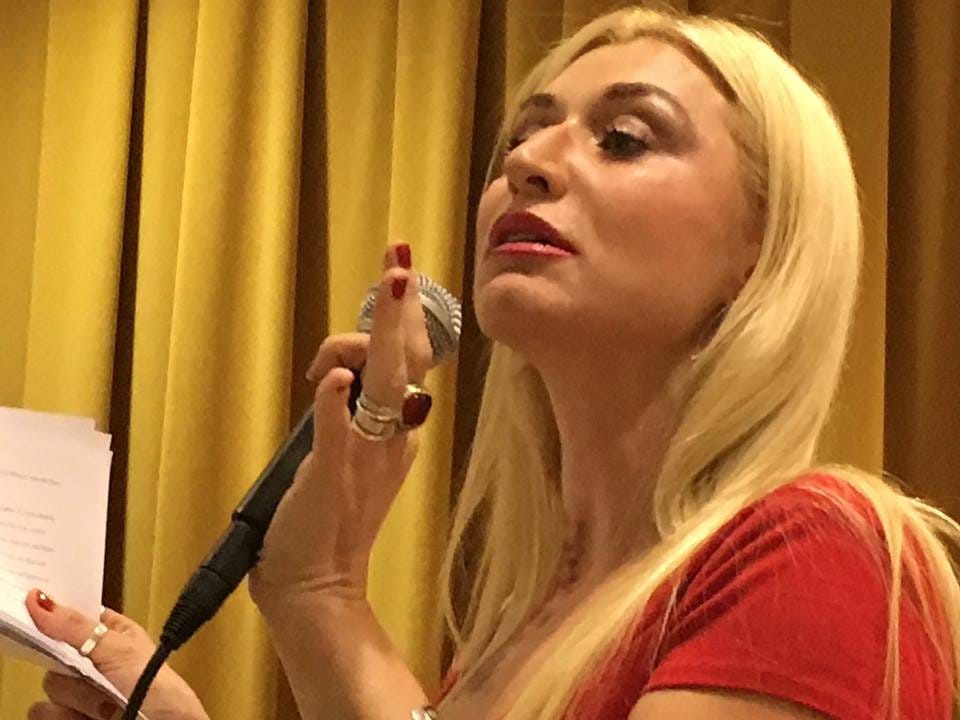
Zarina Zabrisky is an award-winning American novelist, short story writer, spoken word artist, translator, and expert on Soviet combat propaganda. Born in Russia, she now lives in the Bay Area of California.
We chatted about Soviet propaganda, Putin, corruption, Pussy Riot, and much, much more:
GREG OLEAR: Let’s start at the beginning. You were born and raised in St. Petersburg, which at the time was still called Leningrad and the second-largest city in the Soviet Union. You studied at St. Petersburg State University—the alma mater of Rosneft CEO Igor Sechin, former prime minister Dmitri Medvedev, and their current boss, Vladimir Putin.
ZARINA ZABRISKY: True, but the university was called Leningrad State University at the time. Sechin studied at the same department, called Philological Faculty, specializing in Portuguese and Spanish languages. Dmitry Kiselev, Putin’s favorite journalist and Kremlin propagandist-in-chief, also was a student there, specializing in Scandinavian languages. I studied the English language, with a focus on literature, at a later time but during the same era. All linguists had to take a special course in combat (“spetz”) propaganda.
GO: Combat propaganda? What’s THAT all about?
ZZ: It had many names: combat or military, or, in Russian, “spetz,” propaganda, “Special propaganda among the troops and the population of the enemy” (Code VUS 6021) was a military science, developed in the USSR and taught at elite universities, such as Moscow State University (MGU)’s Department of Journalism, and Leningrad State University (LGU, currently St. Petersburg State University)’s Department of Philology.
GO: So propaganda and mind control really were part of the Soviet higher-education curriculum.
ZZ: Yes, but only for a few. These were, and are, elite universities. Most people did not know anything about these departments.
GO: What was the underlying theory?
ZZ: To change mass behavior, spetz propagandists—currently called “political technologists”—influenced the mass consciousness by purposefully incepting artificially engineered concepts inorganic to the population with the goal of “formation of the mass consciousness of the whole society” and “influencing global policies,” as described in military textbooks that can be found online these days.
GO: We have a name for that here, too: fake news. This is what Mueller’s indictment of the “13 Russians” was all about. And, long before that, the KGB originated the conspiracy theory that the CIA assassinated JFK.
ZZ: I think the main differences between fake news and combat propaganda are the centralized approach and military nature of the latter. The better equivalent is psy-op. During the Cold War, the Soviets conducted over 10,000 disinformation operations. The fabrication and dissemination of conspiracy theories about FBI and CIA involvement in the assassination of John F. Kennedy was just one of them. The US government inventing the AIDS virus was another one. At the height of the Cold War, up to 15,000 KGB officers are said to have worked on psychological and disinformation warfare, which they learnt in a special “active measures” course created by then-KGB head Yuri Andropov.
GO: Back then, this was all top secret, I assume?
ZZ: Everything was classified. The entrance to the military department was restricted, and nothing could be taken off the premises so there were no textbooks. At the time, there was no “online” information so no open-source material existed.
GO: Like a SCIF.
ZZ: An anecdote that I have shared quite a bit: we had notebooks that we had to pierce with giant shoemakers’ needles, tie together with ropes, number every page and seal with the 19th century-like wax at the end of the day. The notebooks then were stored in a vault. The pages were counted every time and if a page went missing (here comes the cherry on top in this story; we did not have toilet paper in the USSR and the pages DID go missing), the officer teaching us how to write pamphlets would not shy away from looking for the missing state secrets in the toilet.
GO: What was in the pamphlets, that they guarded them so closely?
ZZ: The pamphlets themselves were pretty ridiculous. A classic example I remember is “American soldier, surrender, you are surrounded.” However, they taught us the tactics and the basics of psychology—and that works really well, as we now see.
GO: Is there an example of something happening now that connects with what you learned about propaganda back then?
ZZ: Yes, definitely. This is how I first discovered they were at it, in March 2015. On March 10, a friend saw a photograph of Putin hugging a cuddly koala bear in front of the main medical school in San Francisco. The caption read: “PUTIN IS YOUR FRIEND.” Next to it there were posters “WALL STREET IS FINISHED,” “IMPEACH OBAMA,” American flags, and a poster explaining that the Russian president was framed in the recent assassination of an opposition leader. She took a photo of it:
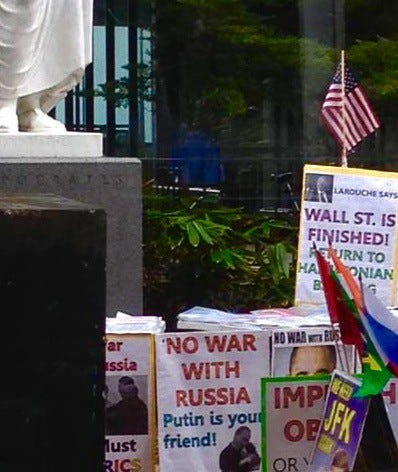
GO: Oh my God, it cites Lyndon LaRouche, one of the original left-wing wackadoodles.
ZZ: Well, Lyndon LaRouche movement is supported by the Kremlin. In Russia, Lyndon LaRouche is presented as a “ well-known American economist, a leading scholar,” martyr, hero and a victim of the US injustice on the main channel of Russian TV. In January 2017, right before Trump’s inauguration, I photographed La Rouche recruiters in front of the Russian Orthodox church in San Francisco.
GO: I remember on 9/11, as I walked downtown from Rockefeller Center, some lunatic had set up a LaRouche table on Second Avenue and was furiously handing out pamphlets. But enough about him…what’s with the koala bear?
ZZ: Using images of cute animals is one of the classic methods. I wrote about it in May 2016.
GO: Anyone who’s watched The Mandalorian can confirm that half the reason that show is so successful is the cuteness of—how shall I say this so as not to spoil it?— “the asset.”
ZZ: Here is my analysis of a text spinned by the Kremlin trolls. And here is a very recent example, freshly delivered last week:
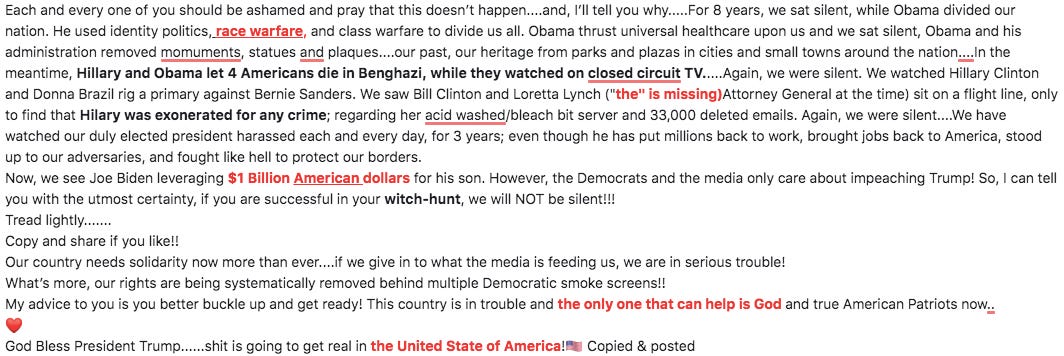
GO: That looks like one of the bullshit Facebook posts that are microtargeted.
ZZ: They are written by the same “political technologists.” I wish I was a more diligent student of propaganda so I can report everything they were teaching us but—alas!—I was only interested in literature (I still am.) Unfortunately, I had to undust this course after I realized that my former classmates are at it and waging a hybrid war on the West using the tactics and strategies taught in this course. I have written many articles on the subject and gave a few lectures available on YouTube.
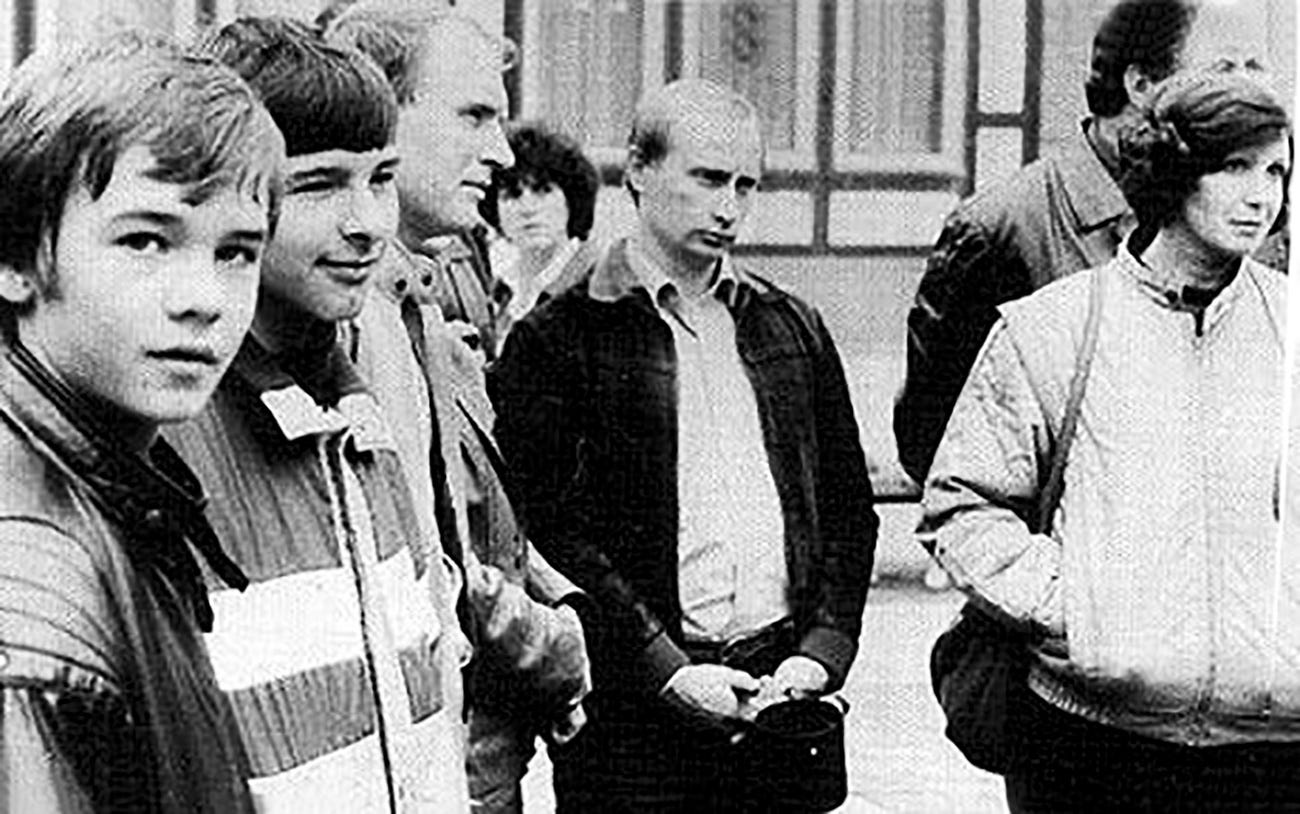
GO: I know they are older than you, but did you form any impression of Putin or Medvedev from university?
ZZ: I was fortunate enough to never study with them even though they did go to the same university. In addition to being older they attended a different department, the law department. It is a big university. Putin, it is important to understand, did not get into LGU on merit. He got there as an athlete and as a protégé of his coach, Leonid Usvyatsov, a Leningrad mafia boss.
GO: Putin’s mob ties are less obvious than, say, Trump’s.
ZZ: Not for people from the former Soviet Union and Russia now. It is a well-known fact that Putin is a mobster. He and his cronies go back to what was called the “wild 90s.” I have written about it many times. I once translated an excellent article by one of Russia’s leading investigative journalists documenting Putinism. His works are banned in Russia, and he publishes under the pseudonym Artyom Kruglov. No one knows his identity or location. There were many good documentaries on the BBC and PBS, as well.
GO: Tell me about Leonid Usvyatsov. I’ve never heard of him.
ZZ: Most people have never heard about him, because he was a small crook from Leningrad and had no role in history other than being Putin’s mentor. A colorful figure, Usvyatsov coached martial arts, worked as a stuntman and started one of the main organized crime group in Leningrad, the Tambov OCG, of which his student later became a part of. An excellent investigative journalist and blogger whose work I have just mentioned, Artyom Kruglov, writes about it at length here. Usvyatsov did not leave any space to doubt his mafia status. His gravestone proudly depicts his own “poem”: “I am dead but the mafia is alive.”
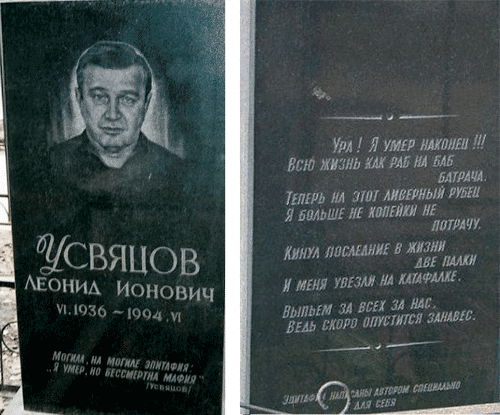
Anyway, this is how Putin managed to get into a prestigious university.
GO: That is also how Donald Trump got into Penn, more or less.
ZZ: Well, not really. Trump comes from a rich family. Putin grew up in squalor; his father was a factory watchman and his mother was a cleaning lady. (His grandfather cooked for Stalin at party dachas, but that is a different story). Putin grew up in a city that was still recovering from the Siege. There was nothing privileged about Putin, but he also didn’t make it to the top by working hard or by being brilliant. He got to the top because he is a crook and a thief. He got into university because he hung out with bandits and he then climbed all the way up the ladder because he worked for the KGB.
GO: Did you meet anyone at university who was a big wheel in Soviet politics?
ZZ: I did know a “young communist” leader who made it to the top. Anton Gubankov, who once shamed and threatened to kick me out of school for being friends with a girl who dared to marry an American. He served all the way up to the Director of the Department of Culture in the Russian Ministry of Defense. He was credited with the invention of a euphemism “polite little people” for the Russian soldiers invading Crimea in 2014. He was also an author of some horrid Russian military rap songs. He died in a plane crash on December 26, 2016, along with many young men from the military choir on the way from Ukraine to Syria. A horrible life matched by a horrible death.
GO: After leaving the KGB, Vladimir Putin served as foreign affairs advisor to Anatoly Sobchak, who was the mayor of Leningrad, from 1990-96. What were your impressions of him at that time, if you had any?
ZZ: In 1995, I briefly worked for Putin’s predecessor at the Mayor’s office. It was the only time in my life that I worked for a Russian employer. Ilya Baskin was a founder/owner of several major companies in St. Petersburg at that time (Garant, Technochim, Port-Invest, Ust-Luga Port [currently partially owned by Putin’s ally Timchenko and his company Gunvor], etc.), General Director of the Union of Entrepreneurs and Tenants of the USSR and the RSFSR. In 1993, Baskin was elected People Deputy of RF and in 1992-1994, he was on the Board of the Russian President Entrepreneurship Committee and a member of the RF Government Council on Industrial Politics. My official position was the Director of Foreign Relationship of Consortium Europe-America 500, and Baskin promised to fund my idea for an educational business—but in reality, I was just translating for him. Consortium started as the first private, commercial spaceflight launched by a Russian rocket-building company, by the way. In 1992, Baskin literally launched a spaceship to America.
GO: A spaceship?
ZZ: Like many stories of the “wild 90s”, this one is insane. There is even a Wikipedia entry on this.
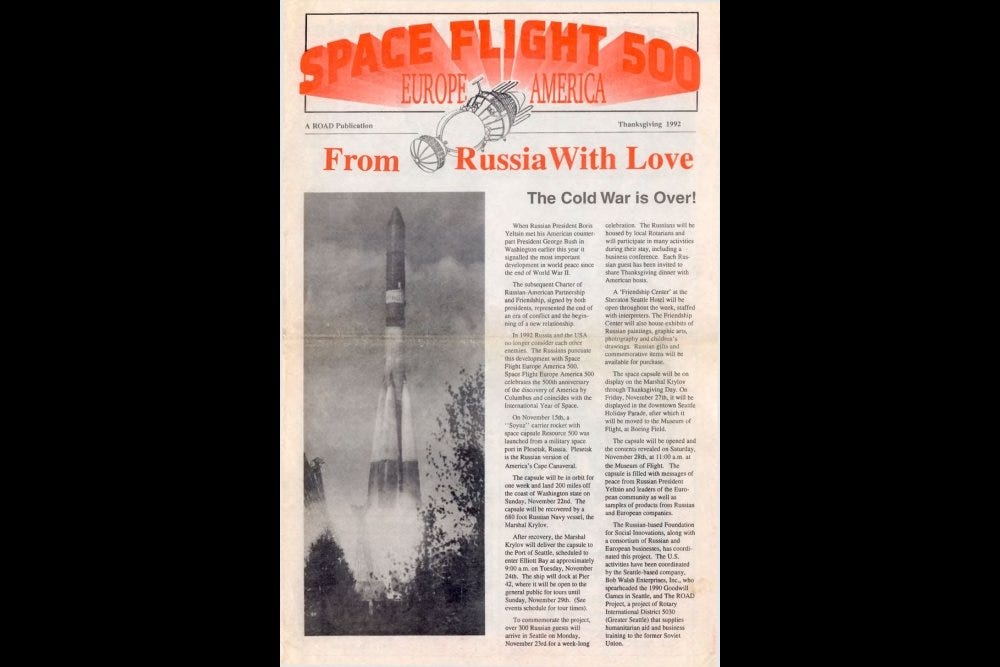
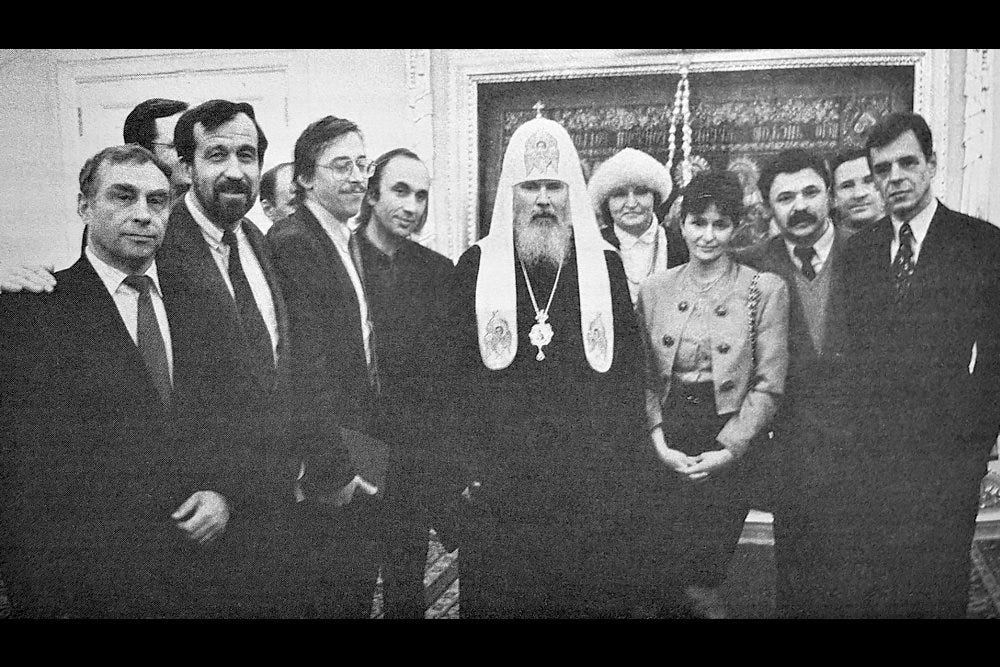
The spaceshift was blessed by a Russian Orthodox priest. The guy with moustache to the left of the lady is Ilya Baskin.
So in 1991, Baskin was assigned by Sobchak, the mayor of St. Petersburg, to work in the capacity of a Deputy Chairman of Food Supplies Committee. At the time of the deal, the Soviet Union had just collapsed, and the city had food shortages due to the poor economy and dysfunctional distribution system. I suffered the crisis of 1991-1992 first hand while working at the Grand Hotel Europe. We had ration stamps for meat and butter, and had to stand in two hour-long lines for bread. This situation was psychologically traumatic for my city, in particular, due to the Siege during World War II.
GO: Sure. The Siege is notoriously awful.
ZZ: Most people, including my family, lost their relatives. I was raised by a grandmother who lost her whole family to starvation. That is why the lack of bread in the stores in the 90s hit us hard. The cynicism of our government was yet harder to take.
A big scandal regarding this situation shook St. Petersburg in 1992. It involved Baskin, Putin (who also worked for Sobchak), and Petr Aven (of Alfa Bank and Letter One, currently). A committee of People’s Deputies accused Baskin of administrative misdemeanors and requested the mayor to fire him in 1991, but Sobchak refused to proceed, supposedly because he was in on the deals.
GO: Hmm. This all sounds extremely Trumpy.
ZZ: It does, especially because there was at least one person who is involved in both crises. Here’s what happened in St. Petersburg: The deputies submitted documents citing Baskin’s multiple crimes and misdemeanors, including fraud, financial machinations, and appropriation of state property, dated November 1991. A barter deal for exchanging Russian raw materials for the Western food supplies required issuing licenses to export companies. The Deputies objected against Baskin being in charge of export licensing for oil products, timber and lumber, metals, ammonia and concrete for the whole sum of 122 million dollars.
Most of the records with Baskin’s name have disappeared but there is an article from 1992, reporting that Baskin was accused by the People Deputies of intentions to export the raw products without importing the food supplies. Putin, acting in the capacity of Chairman of the Committee for External Relations of the City Hall, at the time argued that products could be bought at lower prices. Putin mentioned, for example, the possibility of buying meat in the CIS republics but he refused to give details, citing the fact that these opportunities were only being worked out.
As the investigation continued, it turned out that various businesses received a total of $122 million for their exports, but the city never received any foreign food imports. Marina Salie, a former chairwoman of the St. Petersburg food committee (1990-1993), alleged that Sobchak, Putin, Aven, Baskin and the city government entered into contracts with dubious businesses and shell companies and appropriated the money. According to Salie, Putin signed export licenses, despite lacking the proper authority to do so, and Aven, the Chairman of the Committee on Foreign Economic Relations of the RSFSR at the time and currently co-owner of Alfa Bank and Letter One, covered up for him. Putin denied the existence of these licenses despite the existing copies of the licenses bearing his signature. Now check this out: Petr Aven and Mikhail Fridman of Alfa Bank have multiple connections to Trump and the 2016 US election.
GO: Right, because of course they do.
ZZ: Also, in 2014, Alfa Bank formed a partnership program with Amway, a company owned by DeVos family. In 2016, Alfa Bank was involved in the scandal with Trump’s server. In April 2016, Richard Burt, a former member of the senior advisory board of Alfa Bank and currently a Board member of Letter One, helped to draft Trump’s first policy speech at The National Interest. From 2002 to 2007, Burt was an Executive Chairman of Diligence LLC, a Washington-based private global intelligence firm, in which Nathaniel Rothschild, Deripaska’s business partner, owns a stake. In 2007, Diligence LLC was charged over allegations of corporate espionage in a case that involved Alfa Group Consortium. Peter Aven of Alfa-Bank was a sponsor of the New Economic School that paid for Carter Page’s visit to Moscow in July 2016. Robert Mercer’s funds bought US-listed shares of two Russian telecommunications firms with significant operations in Russia and Ukraine, including VimpelCom (VIP), an affiliate of Alfa Bank, founded by Fridman and Aven. Robert Mercer, the co-CEO of Renaissance Technologies LLC, invested about $5 million in Cambridge Analytica and owns 90% of Cambridge Analytica.
(More here).
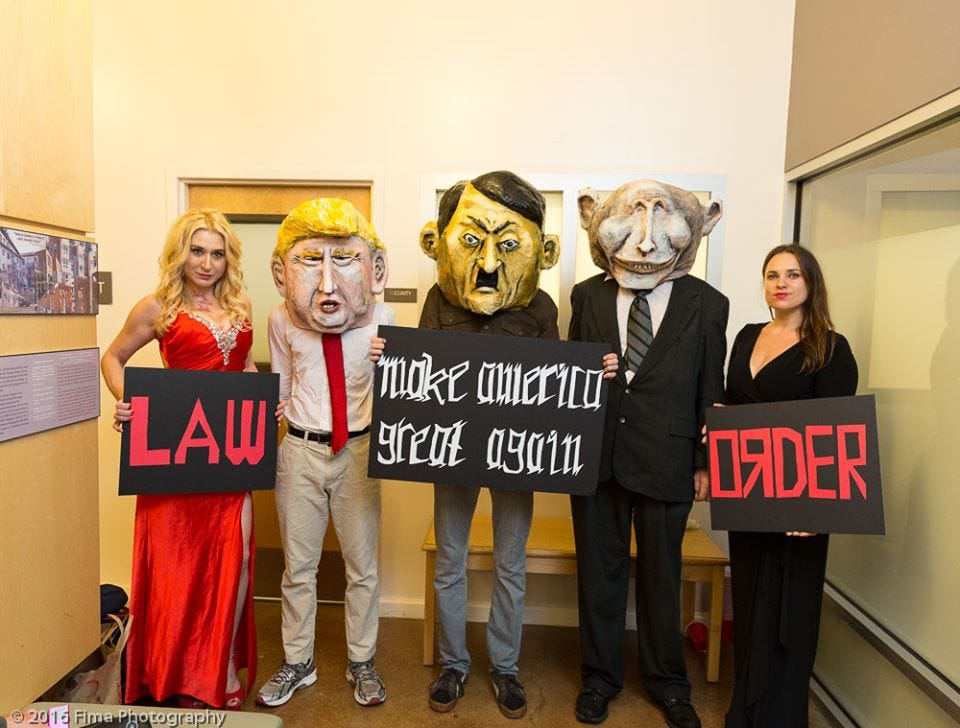
GO: So Putin and his cronies—which now include Trump and his cronies—has always been a thief.
ZZ: Yes. In fact, in 2018, a group of the world's leading experts gathered in New York for a conference called PutinCon, basically dedicated to the fact that Putin is a thief and criminal. I reported live from it and covered it in detail, as the world really needs to pay attention.
GO: This piece of shit criminal, this profiteer who exploited a food shortage—who stole food from babies to make himself money—is who now controls Donald Trump.
ZZ: But back in 1992, in St.Petersburg—and this is what is important—the scandal was silenced. After Putin came to power in 1999, the documents disappeared from the archives. However, Marina Sale, who lived in a distant village in solitude after Putin’s rise, gave several interviews in 2010 and after her suspicious death in 2012, the copies of the documents were published on her Facebook account (where they can be found.) Some of these documents are signed by my family friend, and a neighbor, People’s Deputy at the time.
The files testify to the responsibility of Putin and his deputy Alexander Anikin for exporting raw materials at a low price and without paying customs taxes. In addition, the documents contain inquiries to government agencies about the actual whereabouts of this raw material in the warehouses of St. Petersburg: 750,000 cubic meters of timber, 150,000 tons of petroleum products, 14 tons of rare-earth metals, etc. There is one document with Baskin’s name. There is also a reference to Baskin’s suing Salie for defamation.
This story resurfaced in 2012, and many people believed that it had the potential to sink Putin but it never went anywhere. A few people were killed, and the journalist researching this story, Vladimir Ivanidze, had to leave the country. Most people are afraid to openly deal with it and for good reasons. You perhaps know what happened to Paul Khlebnikov, Anna Politkovskaya, etc. I helped an activist-friend to escape Russia a few years ago after he was arrested twice and physically attacked in front of his building in Moscow.
GO: Yes, I have Anna Politkovskaya’s book. It’s gruesome.
ZZ: There is another story involving Baskin that explains how the agents of influence were recruited by the former Soviet operators. My last—and most dramatic—experience with Baskin was a thriller material. Literally. I translated at his one-on-one negotiations at luxury Kempinski hotel in Moscow where he offered the EU Ambassador to Moscow, Michael Emerson, a consultant job with a three-year contract and a salary of 70,000 dollars in exchange for giving the right to distribute TACIS—EU monetary aide funds—in Russia.
GO: I’m not familiar with TACIS.
ZZ: TACIS is an abbreviation of “Technical Assistance to the Commonwealth of Independent States,” a foreign and technical assistance program implemented by the European Commission to help members of the Commonwealth of Independent States (as well as Mongolia), in their transition to democratic market-oriented economies. TACIS is now subsumed in the EuropeAid programme. Launched by the EC in 1991, the TACIS provides grant-financed technical assistance to 12 countries of Eastern Europe and Central Asia.
GO: Okay, so you’re there with Baskin and Emerson…
ZZ: I was shocked when the EU Ambassador accepted the offer and bargained for more money, claiming that he had a wife and three kids, including two college-age daughters.
Immediately after the meeting, I asked Baskin for a resignation. By 1995 ,we had even more murders and knowing that much was extremely dangerous. Baskin had two armed bodyguards, and I know that they threatened opponents. He agreed to let me go, and I had to keep my mouth shut, which I did for over 20 years. I was always grateful to him for letting me go. He could have had me killed. So, Baskin hired another translator (also a graduate of my university) who had an affair with the EU Ambassador and ran away with him. Her American engineer husband hacked her emails and discovered the correspondence with Baskin, and bribes were involved. He forwarded the correspondence to the Western press and there was a scandal. Here is an article in the Washington Post that reads like a bad movie. I lived that movie. By the way, the femme fatale wasn’t a bombshell at all; she was quite an average-looking woman, but apparently she could manipulate men very well. She was married to a Soviet diplomat before (who died under suspicious circumstances). The EU Ambassador was investigated and attempted to resign… and not much happened to him, really. Last time I checked he lived in Brussels happily, ran a consulting business and was still married to that interpreter.
GO: And Baskin?
ZZ: Baskin, however, stayed under water for about ten years since 1998 and he had good reasons for it. As of 2017, he had about 300 lawsuits against him but he seemed to be still prospering in St. Petersburg—but staying out of politics. As of 2000, his wealth was estimated at $100 million. This story, though, is a good illustration on how the Russian mafia and KGB turned people of influence into their assets. Bribes, women, and blackmail (I have stories about that, too.) I didn’t talk about it for twenty years but then I wrote a short story about it in 2012, and it is included into Explosion, my short story collection.
It is still a bit scary.
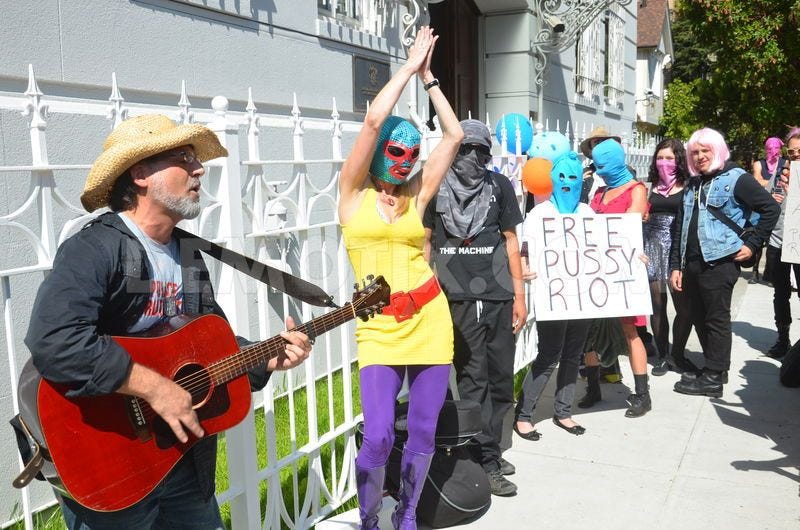
GO: You participated in protests in support of Pussy Riot in 2012. That seems to have been your political awakening. Why did you decide to participate, how did you participate, and what effect did it have on you going forward?
ZZ: Yes, it was the first protest I ever went to ever, and I also organized it. Actually, I did go to the protest in August 1991, during the coup, when the Communists tried to capture the power and restore the USSR but it really doesn’t count because we were celebrating my friend’s birthday and would be out anyway! And also, everyone was out because the tanks were coming and we definitely did not want to go back to the Soviet system. So anyway, I could really understand the young women of Pussy Riot when they could not take Putin’s regime. Like many other people, I was devastated to hear that they had to go to prison for a few minutes of performance. I contacted the world protest organizers and they said that there was no protest in San Francisco. So I set it up… and protested a few more times during the course of their trial. As a writer, I felt it was important to educate Americans about Putin’s totalitarian system and it was also fun to explain Pussy Riot’s aesthetics and philosophy. They had a sophisticated code language, and the linguist in me really enjoyed breaking it down. I was not intending to continue writing about politics, but Putin’s regime committed outrageous crimes on a daily basis and I felt that I could at least support the opposition. And after Russia occupied Crimea, there was no way back for me. I spent every summer in Crimea as a child, and some of the time in Odessa, Ukraine, and I love Ukraine dearly. All my best childhood memories are from there. And even if they were not, what Russia was doing to this country and its people was (and is) beyond despicable. So I wrote and participated in rallies and performing arts protest in front of the Russian Consulate since 2014.
GO: Vive la Resistance!
Photo credits:
From a reading in New York, Poets House, 2015, Photo credits: Nina D'Alessandro.
From a performance at San Francisco Litquake Festival 2016, October 15 (a month before the election.) I am a co-founder of the Arts Resistance collective; we then won not to vote for Trump. Photo credits: Fima Gelman.
Pussy Riot Protest, August 2012. In front of the Russian Consulate in SF (closed now.) I am in a yellow dress and a blue face mask.




...'GOa photo of it:
https://substackcdn.com/image/fetch/f_auto,q_auto:good,fl_progressive:steep/https%3A%2F%2Fbucketeer-e05bbc84-baa3-437e-9518-adb32be77984.s3.amazonaws.com%2Fpublic%2Fimages%2F2ba31405-c6cd-423e-b00a-bfc6b8fa573e_398x472.jpeg '...
(article)
Read in the Substack app
Open app
Know Your KGB Propaganda: An Interview with Zarina Zabrisky
On Putin, "spetz," and Russian active measures
GREG OLEAR
JAN 3, 2020
'GO: Is there an example of something happening now that connects with what you learned about propaganda back then?
ZZ: Yes, definitely. This is how I first discovered they were at it, in March 2015. On March 10, a friend saw a photograph of Putin hugging a cuddly koala bear in front of the main medical school in San Francisco. The caption read: “PUTIN IS YOUR FRIEND.” Next to it there were posters “WALL STREET IS FINISHED,” “IMPEACH OBAMA,” American flags, and a poster explaining that the Russian president was framed in the recent assassination of an opposition leader. She took a photo of it:..' (article)